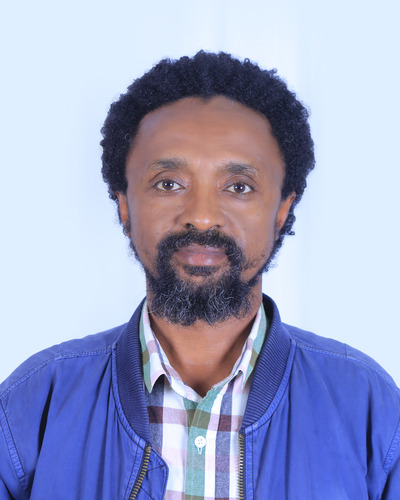share

Freweyni in her new wheelchair. | © HI
HI regional logistics manager, Tilahun Abebe, shares the highlight of his recent visit to Tigray, Ethiopia.
 I was able to visit Tigray this summer for a week. Since no one had been able to visit our team in Tigray for quite a long time due to security constraints, this was one of the best missions I have done with HI.
I was able to visit Tigray this summer for a week. Since no one had been able to visit our team in Tigray for quite a long time due to security constraints, this was one of the best missions I have done with HI.
One morning, during breakfast with my colleagues, the silhouette of a woman appeared in the distance and caught my eye. I could see her making her way across the cobblestone pathway, fading in and out of my view between the many passing pedestrians in the road, crawling on her hands and knees. We crossed the street to find her propped up on some stairs leading to a roadside shop, with one hand supporting her weight, and the other stretched out to beg for money. Neither the man in the shop nor the people passing by seemed to pay her any attention. I was not surprised, as I had already noticed an overwhelming number of people begging in the street since my arrival in Mekele: from small children to elderly persons, clearly internally displaced from other parts of Tigray. You could tell from the looks on their faces that many were new to this way of life and were living very differently only a few weeks or months earlier.
I am an Ethiopian citizen, still living in Addis Ababa, and I have traveled to many regions of the country where I have become familiar with the various types of people forced to beg in the street.
But, the scale and desperate situation of the people I saw on the streets of Mekele that week is something I will never forget.
The woman sensed us standing next to her and turned toward us. I still remembered some Tigrigna language from childhood friends and social media, so I greeted her and introduced myself. She returned the greeting with a smile and kindness, and shared her story with us.
Her name is Freweyni, which means “grapefruit” in the local language. She is a mother to three children and she was born with a physical disability. In the previous years, she was displaced from her home and has since been staying in various shelters around the major market area of Mekele. Her oldest son left home when the war began, but her two younger children still live with her and she is their sole provider. She spends her days begging around the market to try and support her family.
Since meeting with Freweyni and learning about her situation, I put her in touch with our teams. HI has since provided her with a new wheelchair. This means that for many months or years to come, she will no longer have to crawl on her hands and knees to move around. 50 wheelchairs had been sent to Tigray for vulnerable persons in the area, and she was one of the recipients. Having served in many humanitarian organizations for over two decades, this experience remains at the top of all I have encountered. It’s part of what makes me love working at Humanity and Inclusion.








HI is an independent and impartial aid organisation working in situations of poverty and exclusion, conflict and disaster. We work alongside people with disabilities and vulnerable populations, taking action and bearing witness in order to respond to their essential needs, improve their living conditions and promote respect for their dignity and fundamental rights.
HI is an independent and impartial aid organisation working in situations of poverty and exclusion, conflict and disaster. We work alongside people with disabilities and vulnerable populations, taking action and bearing witness in order to respond to their essential needs, improve their living conditions and promote respect for their dignity and fundamental rights.